Years ago, a Jewish friend put me on to the word mitzvah. She was using it in terms of someone performing an unexpected and beautiful kindness, but the meaning goes far beyond the phrase, “perform random act of kindness,” that became popular a few years ago. I was reminded of this deeper spiritual dimension of mitzvah recently when a friend I’ll call Alec and I had tea on my deck.
“The recent deaths are all ambushes,” Alec said. He was talking about the killings of Canadian police officers. “I just got back from a funeral in Ottawa last week. And before that, it was Edmonton.” I knew Alec had also recently attended funerals in Nelson and one in Richmond where 32-year-old Constable Shaelyn Yang had been killed; the streets had been lined with around 4,500 first-responders paying tribute to her.
Police and emergency services personnel and civilians line the street outside the B.C. RCMP detachment in Surrey to pay their respects to Const. Shaelyn Yang as her body passed by in procession. PHOTO BY JASON PAYNE
Alec is a police officer in a city one province over but he and his wife Isla (not her real name), who’s also a police officer, and their daughter, recently bought a house just around the corner from me. Alec and Isla are retiring to Pender Island; they’re counting down the years. I met them five years ago when I walked over with a plate of fresh-baked muffins, somewhat grumpy because my pal Sally’d had to sell that place. Bad family dynamics and her son’s divorce, and bingo, she didn’t own a house anymore.
Over the years, Alec and Isla and I have bonded over wine on their deck and on mine. We’ve shared the loss of my husband, gardening, kayaking, and bear stories—Alec used to be a wilderness guide. He and Isla have become valued friends and neighbours.
So I wince for Alec that he’s going to all these funerals; it’s emotionally rough and I don’t see why he always has to be the representative from his city. Why can’t someone else step up?
“But I thought other people from your area were going to the funerals,” I protested. “Take it in turn so you wouldn’t have to do it every single time.”
Now, on my deck in the cool sun hazed with smoke from forest fires, Alec shrugged. The smell of smoke made the afternoon feel ominous, though I knew the fire was hundreds of miles away. “Spreading the travel around was the idea. Then when the time came, everyone else said they were too busy. No one was going to go to these last funerals. So I said I would. There are so many.” He scratched my dog’s ears. We were both aware that 2023 has been the deadliest on record for Canadian police officers: 10 have died to date. I don’t ask Alec how many times he’s represented his city, I’m afraid the answer is going to be almost all.
The funeral of any officer killed in the line of duty is a gut-wrenching pageantry that involves the gathering of officers in full dress uniform from all over the country. Protocols differ between forces. The ceremony may include a procession where thousands of officers march before, beside, and behind a hearse, the pace kept crisp by the drums and bagpipes of a regimental band. It’s colourful, sombre and enough to bring tears to the eyes of a stone Buddha.
Every single officer at that funeral is thinking, Tomorrow, this could be me.
How do I know this? Years ago I spent time doing research with an RCMP Major Crime unit for a book I was writing. They were careful with the information they shared with me but I hung in and I hung out. I brought plates of home-made cookies to Watch Briefings, quick round-the-table updates at the beginning of a shift change, and I went on ride-alongs with any uniformed officer who’d take me. It was amazing to me that they let a civilian get so close. Of course some officers had no time for me whatever.
Over several years and many of cups of coffee, I came a long way toward understanding how keyed-up and on edge it could be to never know what violence was coming whenever a person went to work. On one ride-along, I had an officer heading into a party situation instruct me how to use the car radio and what to say to call for backup if she didn’t come back within five minutes.
I’ve been in a police car when we answered a call for an armed robbery, another one for shots fired. The different officers involved told me, “You stay in the car!” and I did. I wasn’t fool enough to get in the way with suspects lying face-down on the tarmac, boxed in with police cars, the scene lit by headlights and officers moving around with guns drawn.
The Staff Sergeant in charge made it clear to me I’d never be allowed on a high speed “lights and siren” call, I’d be dropped at the side of the road immediately if that happened. However, once I was out with a very experienced officer and a call came in for someone driving dangerously and erratically. We were by far the closest unit. This was daylight, summer, on a two-lane highway clogged with tourist traffic.
The officer driving asked if I’d like to stay in the car. He was giving me a choice? I was so up for this!
It took less than sixty seconds for the drive to escalate into terror as our car twisted in and out of traffic on a highway I knew well but never like this, not with cars and campers scattering like chickens as we approached. Some vehicles pulled over, some stopped in the middle of the road as our car blew by, the officer driving finding holes, somehow, remarkably, in the lines of traffic, rocketing from one side of the yellow line to the other. In order to stay in my seat, I actually had to reach up and clutch onto the grab bar by the door.
Over the radio, the dispatcher relayed more reports of two more vehicles that had been almost struck.
The driver turned out to be a white male in his thirties, so thin and miserable that he still haunts my heart. There was a pathetic dignity to him, a politeness. He was so out of it on drugs, he had no idea why he was being stopped. He’d almost killed several families that day.
At the end of the period I spent researching, an officer died. I’d met him only the week before. It was not a line of duty death, but it was unexpected; he was 38, and the people who’d worked with him were understandably shaken. I was told I could go to the funeral and warned what to expect. If he’d been someone I’d spent time with, I would’ve. But there was no reason for me to intrude.
When an officer is killed in the line of duty, the casket is draped in a flag. RCMP protocols may include a riderless horse, with the slain officer’s boots in the stirrups, reversed, with heels to the front. There may be as many as eight casket bearers, an insignia bearer. It’s a choreographed display of mourning that transcends the personal and takes it straight into the realm of British history. The only thing I can compare it to is a funeral for a head of state. But at at the funeral for an officer killed in the line of duty, there’s shared grief with other at-risk responders. The unspoken beat of, This could be me, pervades every solemn movement. Also, Thanks for your service.
In my imagination, and often in reality, there’s a spouse waiting and young children. Someone hands the flag over to the partner who waits by the coffin.
At one recent funeral, my friend Alec was the officer responsible for giving the flag to the spouse. Now, on my deck, he puts down his tea and runs a hand over his head. Behind him, in my cliff garden, the foxgloves are just coming into bloom. Alec has quite a bit of colour from the sun, which is good as it means he’s spent time spent outside on his quick visit to the island. However, I’d noticed when he sat and stood it was with a hitch and a pause that told me he was having difficulty with his back, which was not so good. “It’s important to the family that someone goes,” he says. “They need to know the death touches everyone across the country.”
Scenes from the Regimental Funeral of Burnaby RCMP Constable Shaelyn Yangin Richmond, BC., on November 2, 2022. Yang was stabbed to death in Broadview Park in Burnaby while checking on a person living in a tent. PHOTO BY NICK PROCAYLO
I shake my head, affection and exasperation mingled. Yes, but why does the representative from his city have to be the same person every time? I’m aware of the health difficulties he is dealing with: “I’m always in pain,” he’d said. And why did someone whose heart was already so sore with the loss of his father, along with a mountaineering mentor, and half a dozen friends in avalanches last winter, keep putting himself in high-hurt situations?
Then I got it: Alec went precisely because his heart was open. Love is potent magic.
While I worried this would injure him, what he was doing was a mitzvah, an expression of soul-deep kindness beyond the call of duty. He went to pay respect to the officer who’d been killed and to show respect to that individual’s family. Beside my chaise on the deck, I had Jack Kornfield’s After the Ecstasy, the Laundry, book-marked; I’d been re-reading it. Alec’s spiritual beliefs were a complete unknown to me. However, when he attended those funerals in the full knowledge that he was going to feel gutted, was this different than the examples I’d been reading of mystics who recognize their pain, acknowledge being in the moment, and allow love to flow through them as best they are able?
Sometimes I think I know a person a little and then I see, suddenly, they are much larger in spirit than I’d previously understood. I put down my mug of tea, look again at my sunburned neighbour and blink back tears.


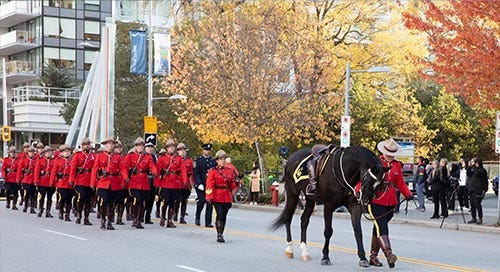


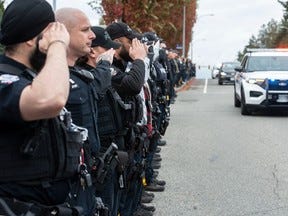

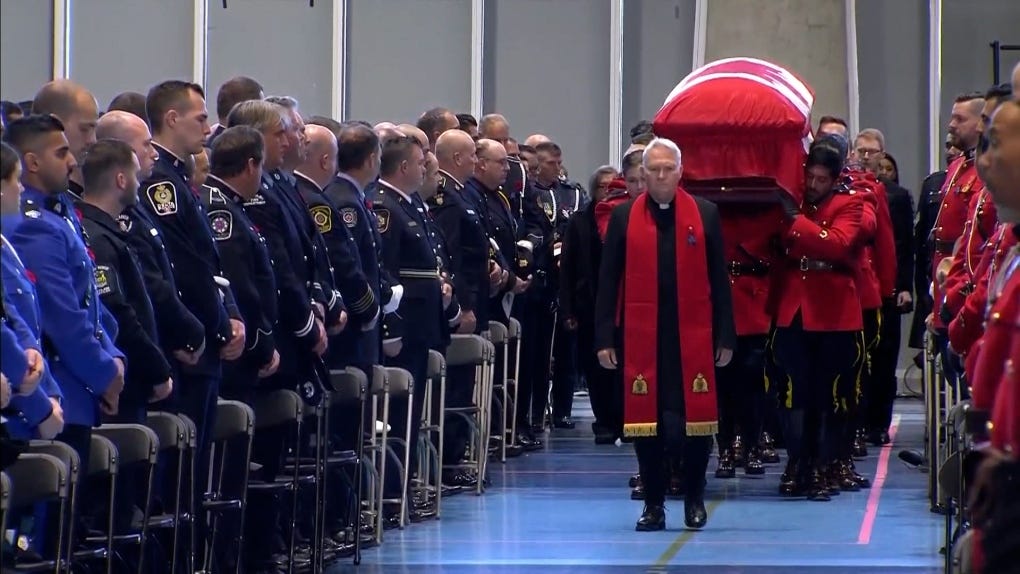
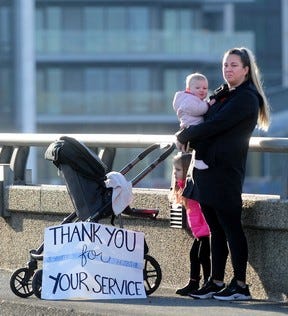
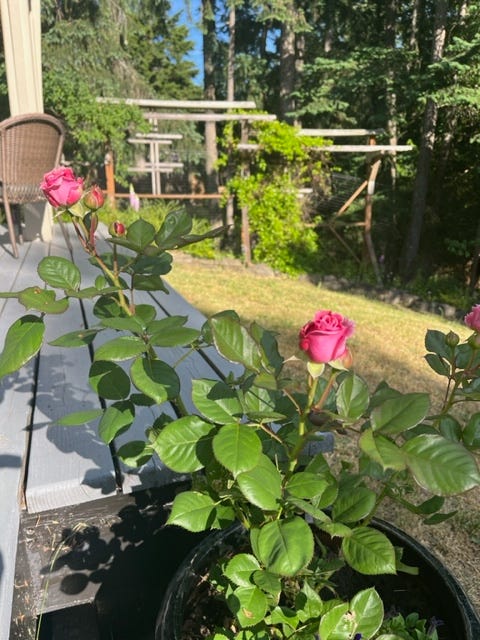
Mark, thanks for your comment. Nice to know I'm so au courant. Here I need an emoji with a wink.
What you said is lovely, and I appreciate it.
I haven't heard "mitzvah" since the late 90s. It's a beautiful thing to witness, receive, and be able to offer.